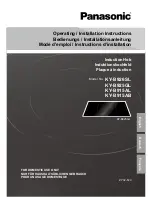
8
Risk of injuries!
■
In the event of a malfunction, switch off the
appliance's electricity supply. For repairs,
call our Technical Assistance Service.
Risk of injuries!
■
Do not tamper with the appliance's
interior. If necessary, call our Technical
Assistance Service.
Risk of electric shock!
Do not clean the appliance using steam
cleaners.
Your new appliance
Page 2 shows an overall view of your new appliance as well as
information on the measurements and power of the hobs.
Electric hobs
Before using for the first time
To remove the new smell, switch the hotplates on to full power
for five minutes, one by one, without placing any pans on top.
Do not switch more than one hotplate on at a time. At this point
it is normal to notice smoke and odours, but these will
disappear over time.
Caution!
Do not operate the hotplates without placing pans on top,
except during this initial heating phase.
Operation
Each control knob shows the hotplate that it controls.
Switching on
Turn the control knob anticlockwise to the required setting. The
operation indicator will light up.
Setting 1: low power.
Setting 9: full power.
Note:
It is recommended to start cooking on full power and
then to use intermediate power levels after a few minutes.
Switching off
Turn the control knob clockwise to the off setting. The operation
indicator will switch off.
Residual heat
The electric hob can be switched off slightly before the end of
the cooking time. The residual heat will enable you to continue
cooking for several minutes, thus saving energy.
Cooking guidelines
The following suggestions are intended as a guide only.
Increase the power for:
■
large quantities of liquid,
■
preparation of large dishes,
■
uncovered pans.
Precautions for use
The following advice is intended to help you save energy and
prevent pan damage:
■
Use pans which are suitably sized for the hotplate. The
diameter of the base of the pan should match that of the
hotplate, and should not be smaller.
■
Use a pan with thick flat base.
■
Do not use damaged pans that do not sit on the hotplate in a
stable manner.
■
Place the pan in the centre of the hotplate. Otherwise it could
tip over.
■
Always use the pan lids when cooking.
■
Do not strike the hob and do not place excessive weight on it.
■
Pans should be placed on the hob carefully.
■
Do not cover the hob with aluminium foil or similar products
when cooking. This could damage the hob.
■
Do not allow liquids to boil over onto the hob and hotplates.
Use deep pans when cooking with large quantities of liquid.
■
The hob must be kept dry. Salt water and wet pans can
damage the hob. Do not cook with wet pans.
Cooking:
Setting
Melting:
chocolate, butter, gelatine.
1-2
Cooking:
rice, white sauce and ragout.
2-3
Cooking:
potatoes, pasta, vegetables.
4-5
Light frying:
stews, roast joints.
4-5
Steaming:
fish.
5
Heating, keeping things warm:
ready
meals.
2-3-4-5
Grilling:
escalopes, steaks, omelettes.
6-7-8
Cooking and browning
9








































